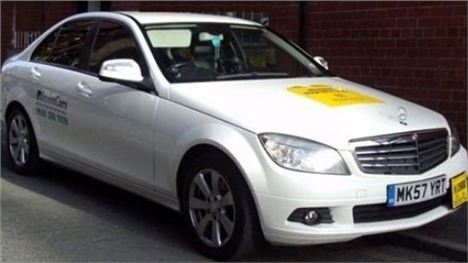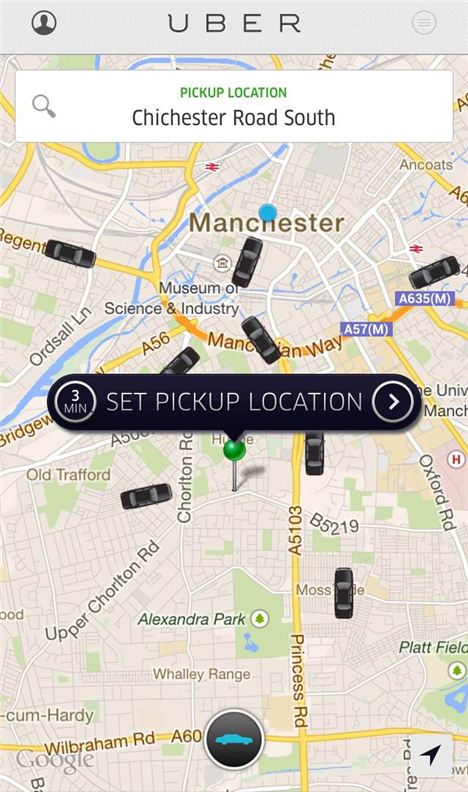CALLING a cab used to be a simple affair. You’d ring your local private hire firm or stick your arm out and flag down a taxi (assuming its amber light didn’t go out before it reached you).
But with technology comes choice.
Many of the bigger taxi companies now have apps so you can spare both your voice and your arm muscles and order a taxi with just a few taps of your smartphone screen.
Any big new international company muscling in on taxi business is going to be met with hostility, but taxi firm versus technology company? That’s not even a level playing field.
Street Cars and newcomer Uber all have free apps like this. In truth, their apps are pretty similar although the companies themselves like to play up the differences and the unique features, naturally.
Each app works by using GPS to locate you then displays the closest available taxis. This means that waiting times should be drastically reduced as the nearest taxi can be dispatched rather than the next driver in line. Hearing, “It’s on its way, love,” as your driver negotiates a traffic jam somewhere north of Inverness could be a thing of the past.
As is standard with these apps, you are shown the nearest available taxis on a map, you tap the one you want and book your journey then follow the taxi's progress towards you in real time.
Besides the basic functions, these apps have been jazzed up. The Street Cars app acts like a concierge in a classy hotel. Not only does it order a taxi, but it can also show places of interest and recommended restaurants to give you some suggestions for your destination. Perfect for tourists and business travellers who don’t know the area.
Other features on the Street Cars app include a list of recent journeys so booking a taxi, something that takes only seconds on these apps, now takes milliseconds. For a taxi from Oxford Road Station to Manchester Airport, press 1.
The Uber app is very clear with good graphics and, to my mind, is probably the most user-friendly and the best-looking of the bunch. During Pride, Uber’s taxi avatars were displayed with rainbow flags attached. This quirky attention to the look of the product is not surprising with a user demographic of mainly trendy, young media types.
The Uber app allows you to find your location using GPS then scroll along to select a more convenient pick-up point for your journey such as by a cashpoint or somewhere under shelter in a downpour.
Of course there is a difference between Streetcars and Uber. The latter is neither from Manchester nor a taxi firm - as such. Based in San Francisco (where else?), Uber came to London in 2012 and has been up and running in Manchester since March but as its website asserts, it is not a transportation service. Manchester general manager, Max Lines, says it is more of a ‘technology company’.
Sifting through all the legal waffle, Uber states in its terms and conditions that it acts as a go-between ‘to obtain third party transportation services’ and ‘has no responsibility or liability for any transportation services provided by such third parties.’
Any big new international company muscling in on taxi business is going to be met with hostility to say the least, but taxi firm versus technology company?
There have been protests in London by black cab drivers at Uber treading on their toes. In the capital, only black cabs have a meter but as the smartphone calculates the fare based on time taken and distance travelled, it is argued that this is a meter and Uber is therefore operating illegally.
Uber’s stance is that the smartphone is not on display, ticking over as the taxi drives along. Instead, it calculates the fare at the end of the journey. Also, the smartphone is not wired to the axle as with a meter.
All this might seem like splitting hairs but there is certainly a lot of bad feeling amongst cab drivers in London, and now Uber have set up business in Manchester, taxi drivers here are feeling piqued too.
In Manchester Uber is a licensed private hire operator as that is a pre-requisite of giving a job to a driver. The disclaimer of warranties in the terms and conditions still sounds ominous though.
Basically, Uber accepts nothing but your money. It does not warrant that the service or the app will be error free, nor does it warrant that the quality of any services obtained will meet requirements or expectations.
When I put all this to Manchester general manager, Max Lines, his response was: “Does it really matter to your average customer what our terms and conditions state?”
A flippant remark but one that is probably true because despite all this nit-picking, there are plenty of reasons to use Uber. For one thing, although the terms and conditions seem to suggest otherwise, when dealing with Uber, everyone seems efficient, friendly and willing to go the extra mile in terms of customer service.
They also only use Manchester licensed drivers who know the area well and they are focused on safety and convenience. When you book a journey you are sent a picture of the driver, his name and the model of car so you can be sure which taxi you are getting into. There is also no struggle to extract the last pound coin from the pocket of your skinniest jeans as all payments are cashless, coming directly from your bank account.
Reasons against too – not being able to pre-book, a £4 cancellation fee, higher fares at busy times and being unable to pay cash will put some people off. Although Uber argue that removing money from the situation is safer for drivers as it removes the threat of robbery and it can take the heat out of drunken 2am disputes.
Apps don’t come cheap however. Street Cars alone have invested half a million in technology in the last few years and have seen the proportion of their bookings made by app rise from 1% in 2013 to 5% this year. Street Cars is an established operator and Uber’s presence doesn’t really threaten them. For one thing, their customers are from a different, wider demographic.
With uniformed drivers who have all sat through Street Cars' very own Knowledge test, and clean taxis that are subject to spot checks by their own eight-strong team of taxi inspectors, Street Cars scores points on service and has good relationships with many of the hotels and restaurants in town.
Humara Arshad, accounts director at Street Cars, explained that keeping up with technology was important but that Street Cars’ success lay elsewhere: “It’s not just an app, it’s the whole business behind it.”
And as for the rivalry with Uber?
“It doesn’t worry us. We’re confident in what we do.”
Street Cars may not be worried about the presence of Uber in the market nor the other taxi apps out there – they’re a big fish when it comes to taxis in Manchester with between 40 and 50 thousand journeys a week. It’s the minnows of the taxi world who will be worried. Investment in new technology costs money. A lot of it. Money many smaller companies do not have.
As the way people book taxis changes, the company they book them with may change too.










